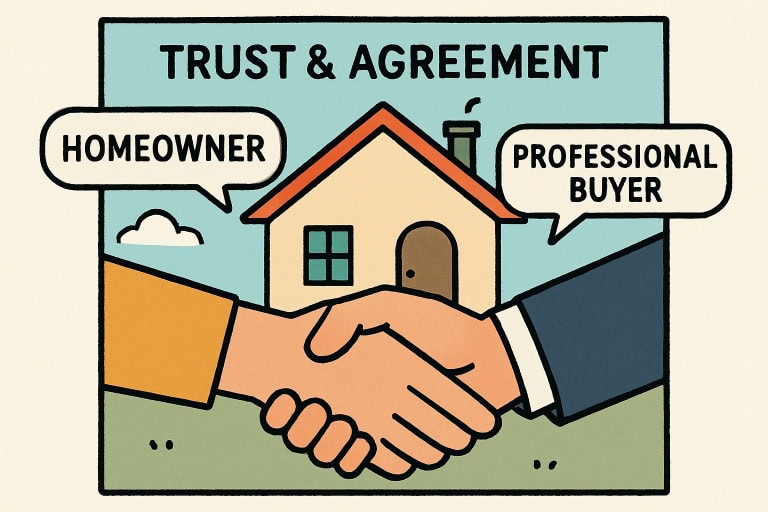Key Takeaways
- Conduct due diligence on cash buyers by verifying business credentials and online reputation.
- Reputable buyers provide clear communication, proof of funds, and transparent contract terms.
- Be wary of requests for upfront fees or suspicious payment demands.
- Utilize third-party resources to validate a buyer’s legitimacy and avoid common scams.
Table of Contents
- Verify Business Credentials
- Assess Online Presence and Reviews
- Request Proof of Funds
- Understand the Offer and Contract Terms
- Be Cautious of Upfront Fees
- Evaluate Communication and Professionalism
- Consult Third-Party Resources
- Stay Informed About Common Scams
Selling your home for cash can be an efficient solution for homeowners looking for a quick sale, but working with a trustworthy buyer is essential. With more homeowners seeking the speed and simplicity of cash sales, unscrupulous individuals have taken advantage of the market, making proper vetting crucial. Learning how to differentiate between a reputable buyer and a potential scam is the first step in safeguarding your biggest asset. If you’re considering selling in the Pensacola area, explore trusted options at https://www.reliablecashhousebuyers.com/sell-my-house-fast-pensacola-fl/.
Proactive assessment can protect you from fraud, lengthy delays, and needless stress. Evaluating key aspects of a buyer’s background, financial standing, and communication style is fundamental to a smooth home-selling process. This guide covers every seller’s essential steps to identify a credible cash buyer.
After investigating their public reputation, you should also look for companies that are established, responsive, and forthright in their dealings.
Verify Business Credentials
The foundation for trusting any home buyer begins with verification of their business legitimacy. Reputable cash home buyers and other serious buyers should be formally registered with their state authorities, and you can typically check this through your state’s Secretary of State website. For example, in California, this public resource allows you to search business records, ensuring the company you’re considering is officially recognized and in good standing. While not all cash home buyers must have a real estate license, those who do often exhibit more professionalism and compliance with state and local laws.
Don’t hesitate to request their business license number or documentation that proves their legal status. The absence of such credentials is a major warning sign.

Assess Online Presence and Reviews
One of the quickest ways to gauge a company’s reputation is by researching its digital footprint. An established, honest buyer will have a professional-looking website with transparent information and resources relevant to homeowners. Review their profiles on widely recognized platforms such as Google, Yelp, and the Better Business Bureau (BBB), paying close attention to patterns in consumer feedback.
Companies with consistently positive reviews and a willingness to respond to concerns demonstrate reliability. Conversely, a lack of online presence, overwhelmingly negative reviews, or unresolved complaints should prompt caution. Remember that a few negative reviews are common, but the overall tone and responsiveness matter most.
Request Proof of Funds
Any legitimate buyer will promptly furnish proof that they have sufficient funds available to complete your home purchase. This usually comes as a recent bank statement or an official letter from their bank or financial institution. Verifying proof of funds ensures the sale can move forward expediently, helping you avoid buyers who may back out or cause unexpected delays when closing.
Never accept vague promises about financing. If a buyer can’t provide appropriate documentation, that’s a strong indicator that you should seek out another, better-qualified buyer.
Understand the Offer and Contract Terms
Carefully analyze any offer and its accompanying contract. The document should clearly state the agreed-upon purchase price, the intended closing date, and all relevant contingencies, such as inspection rights and responsibilities. A legal professional should scrutinize or review contracts filled with ambiguous language that disproportionately benefit the buyer without clear justification.
It’s wise to avoid signing anything you do not fully understand or haven’t independently verified, regardless of any verbal assurances during the negotiation process.
Be Cautious of Upfront Fees
Reputable cash home buyers typically do not require the seller to pay upfront fees for appraisals, inspections, or other routine sale-related processes. Most professional buyers will either cover these costs themselves or deduct them from the proceeds at closing. If you’re asked to pay for these services out-of-pocket before the sale is finalized, it’s often a major red flag that signals a potential scam.
Always question the necessity of fees and get every requirement in writing before agreeing to proceed.
Evaluate Communication and Professionalism
Observe every aspect of your interaction with the buyer. Trustworthy buyers are prompt, clear, and courteous in their responses. Watch out for rushed, evasive, or excessively aggressive communication—these are common hallmarks of scam attempts and high-pressure tactics designed to get you to act against your best interests.
Consult Third-Party Resources
Utilize reputable third-party agencies to verify the history and legitimacy of a cash buyer. The BBB is indispensable for reviewing company profiles, ratings, and complaint histories. Additionally, a quick consultation with a local real estate agent or attorney can provide protection, ensuring your transaction adheres to current laws and industry standards. For up-to-date information about scams and home-selling recommendations, browse major resources like the Federal Trade Commission (FTC).
Stay Informed About Common Scams
Be vigilant for common fraud techniques such as promising an overly lucrative cash offer, only to demand a price reduction or last-minute conditions before closing, or requesting the property deed transfer before payment. Awareness of these and other popular scams can help you avoid suspicious deals and secure your transactions.
If you ever feel pressured or unsure, don’t hesitate to walk away or ask a professional for advice. Protecting your interests is always your first priority.
By following these guidelines and remaining informed, you will be well-prepared to recognize reputable cash home buyers and confidently complete your sale, minimizing risk and maximizing your peace of mind.




Leave a Reply